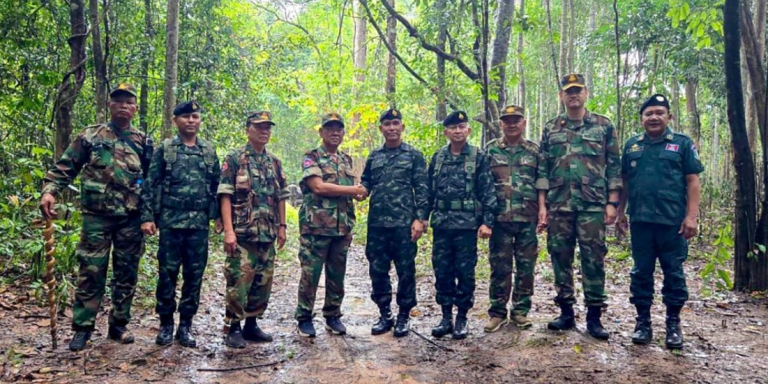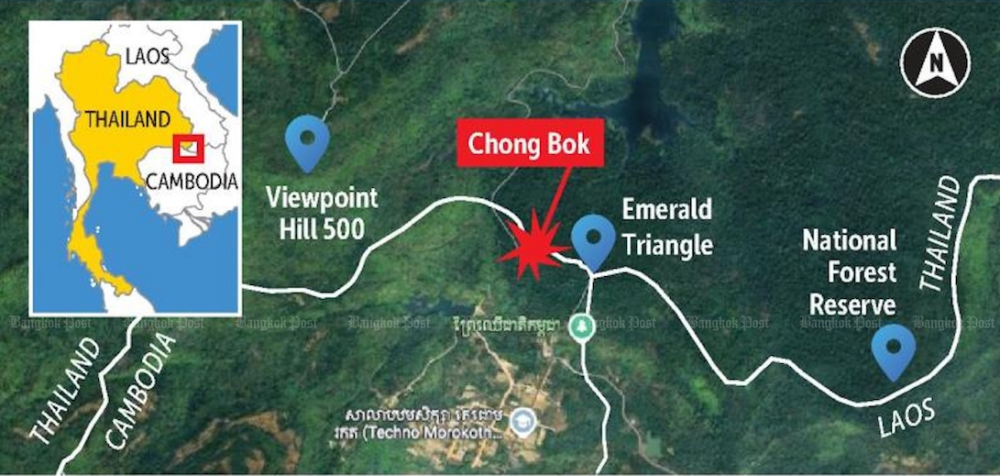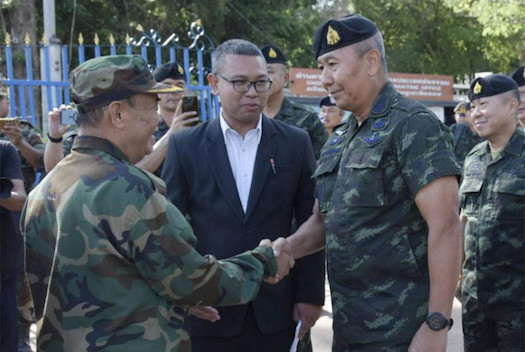
Thai, Cambodian Troops Pull Back After Deadly Skirmish, but Diplomatic Rift Widens
Bangkok—Thai and Cambodian military commanders shook hands recently near a disputed jungle border, agreeing to withdraw troops to positions held before a May 28 firefight that killed a Cambodian soldier.
The fragile truce, however, masks a deepening diplomatic crisis as Cambodia seeks international intervention against Thailand’s objections, reviving a century-old sovereignty dispute that threatens regional stability.

Ceasefire Holds Amid Diplomatic Deadlock
The May 28 clash erupted near Chong Bok Pass—a contested zone in the Emerald Triangle where Cambodia, Thailand, and Laos converge.
Cambodia’s Defense Ministry accused Thai troops of opening fire on a
Cambodian trench, while Thailand claimed its soldiers responded defensively.
The incident triggered immediate troop reinforcements and heavy weapons deployments from both nations. By June 8, military representatives agreed to return forces to 2024 positions under last year’s de-escalation framework. Thailand’s Defense Minister Phumtham Wechayachai called the move “essential to reduce confrontation,” while Cambodia’s Defense Minister Tea Seiha affirmed adjustments to troop placements.
Despite this, Cambodia’s defense ministry later clarified that its forces “have not been withdrawn from any areas under Cambodian sovereignty,” signaling unresolved territorial claims.
Cambodia Pushes for World Court as Thailand Resists
Cambodian Prime Minister Hun Manet announced on June 16 that Cambodia had formally petitioned the International Court of Justice (ICJ) to resolve disputes over four border areas, including Chong Bok. The move followed Thailand’s rejection of third-party intervention.
“Diplomatic dialogue remains the most effective way forward,” insisted Thai Foreign Ministry spokesman Nikorndej Balankura after June 14–15 Joint Boundary Commission talks yielded no breakthroughs. Cambodia’s appeal to the ICJ echoes its 2011–2013 success in securing the Preah Vihear Temple, a UNESCO World Heritage site, through international adjudication. Thailand, however, maintains that the court lacks jurisdiction and advocates bilateral solutions via the Joint Boundary Committee established in 2000.
Economic Retaliation and Border Controls
As diplomatic channels stalled, economic retaliation escalated:
— Cambodia banned Thai fruits, vegetables, and media imports, while disconnecting cross-border internet links.
— Thailand prohibited its citizens from working in Cambodian border casinos and restricted operating hours at 10 key checkpoints. Thailand denied cutting electricity to Cambodian towns, clarifying that Cambodia initiated the power halt.
Thai Army spokesman Colonel Winthai Suvaree confirmed road construction within Thailand’s Ubon Ratchathani Province on June 15, which Cambodian soldiers initially challenged before acknowledging it lay in Thai territory. The incident underscored persistent mistrust.
Flashpoints and Historical Grievances
The 500-mile (817-km) border, mapped by French colonizers in 1907, contains at least four hotly contested zones. Tensions flared in 2008 when Cambodia secured UNESCO status for Preah Vihear, sparking clashes that killed 28 people by 2011. The ICJ reaffirmed Cambodia’s ownership in 2013, but Thailand disputes surrounding areas. Recent incidents reveal the volatility:
— On June 17, Thai troops dispersed 30 Cambodian tourists singing at Ta Kwai Temple in Surin Province, deeming it a “provocative act” in a symbolically charged location.
— Thailand established a Special Operations Centre for Thai-Cambodian Border Situations Management (SOC-TCBSM) to coordinate daily crisis response, though Cambodia indefinitely postponed a key regional military meeting set for June 27–28.

Leadership Dynamics and Regional Implications
The crisis tests the relationship between Thai Prime Minister Paetongtarn Shinawatra and Hun Manet, whose fathers—exiled billionaire Thaksin Shinawatra and longtime strongman Hun Sen—share a contentious political history.
Paetongtarn has dismissed claims that personal ties compromise her stance: “Even though our two families are friends, it doesn’t mean we would allow the country to lose its interests.”
Analysts warn that Thailand’s military could exploit border tensions to undermine Paetongtarn’s government, echoing past coups against Shinawatra-aligned leaders.
Rath Pichanvorlak of the Royal University of Phnom Penh noted the Thai Army’s history of “allow[ing] border tensions to escalate, inflaming nationalist sentiment.”
Seeking a Lasting Peace
While both governments publicly seek calm, their paths diverge irreconcilably: Cambodia champions international law, while Thailand insists on sovereign negotiations. With ASEAN’s credibility hinging on peaceful dispute resolution, the stalemate threatens not only bilateral trade but regional cohesion. As SOC-TCBSM chief Natthaphon Narkphanit stated, restoring normalcy requires “mutual understanding”—a commodity scarcer than territory in this ancient feud 49.
75-Word Audio Summary
Thai and Cambodian troops withdrew to pre-clash positions after a May 28 firefight killed a Cambodian soldier near the Emerald Triangle. Cambodia petitioned the International Court of Justice to resolve four border disputes, but Thailand rejects third-party intervention. Economic retaliation includes Cambodia banning Thai produce and Thailand restricting border crossings. Analysts fear military factions could exploit tensions, risking regional stability.